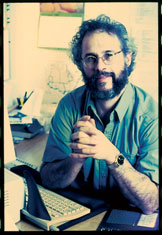By Steve Oppenheimer
(November 2003)
In the heat of the creative process, it’s awfully easy to get in so deep that you lose perspective. That goes double when you produce a large part of a project yourself: you are likely to get so close to your project that you fail to question your creative decisions. The personal studio can be a fortress of solitude that simultaneously stimulates our creativity and leaves us vulnerable to the effects of creative tunnel vision.
I’ve written in the past about stepping back periodically from your project and asking “Who gives a rat’s ass?” — that is, questioning the relevancy of your project. But you also need to challenge individual creative decisions. Some people are able to judge their own work ruthlessly and without sentiment, as if it were someone else’s work. In my experience, however, such people are rare; most of us need outside feedback. We are producing projects for other people to hear and enjoy, and if we fall too much in love with our own work, we might find we are in love alone.
Useful feedback has to come from the right people, though. Some people know how to listen to a track or a rough mix and project what it might sound like when the final parts and sweetening are in place. Others can’t get past the incompleteness. So ask people whose ears, judgment, taste, and sensitivity you trust to listen to key tracks, rough mixes, or whatever you have, and consider the source. It can also be helpful to talk with musicians you trust about your goals and projected songwriting, production, and technology strategies. They might bring up fundamental questions that you never considered.
The secret is to listen without getting defensive. If your consultants think that, for example, the guitar part is too busy, the lyrics are confusing and hard to follow, or the vocals are too far down in the mix, you need to be able to hear that, whether you choose to act on those opinions or not. Being able to do that is often very difficult for artists because our egos are involved in our creative decisions. But the alternative is to risk creating a project that appeals to us alone. Of course, you don’t have to buy into everything — or anything — you’re told; you just need to be able to listen to and consider it.
These points apply to any creative project, including the production of EM, which is why letters to the editor are extremely important. Sure, if you have a technical question, and we can help you, that’s dandy. But e-mailing us about what you want to learn from the magazine is the best of all. Tell us if you think our lyrics are confusing, the mix is unbalanced, or the timbre is too dark or too shrill. Let us know when we got things right, too.
After all these years, I am confident in my ability to step back and judge our work, but I make my share of mistakes and can miss the point at times. You, the readers, are the ultimate judges of what we print. Please give us the benefit of your opinions!
